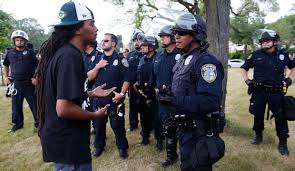The way biases and politics affect policing duties!
M.Y.Siddiqui
Indian police, basking in the glory of the repressive British era Indian Police Act, 1861, continues to be prejudicial, communal, casteist, partisan and politically aligned that affects its core policing duties of being neutral, fair and efficient in enforcing various criminal laws to maintain law and order. As a result, people continue to mistrust the police force with suspicion as a short, nasty, brutish, oppressive and corrupt instrument of state ever ready to frame up adversaries of all sorts, threatening innocents for their incarceration and torture just for extorting money or otherwise. Simultaneously, police continue to be the most corrupt state apparatus in public governance.No wonder, Justice A.N. Mulla of Allahabad High Court had called the Police “criminals in Khaki” in a judgement in 1980s.
Several police reforms measures beginning from Dharamveer National Police Commission of 1977 followed by subsequent three more police reforms committees, Justice Malimath Committee Report on Criminal Justice and above all, the landmark Supreme Court Judgement of 2006 in Prakash Singh Case have borne no fruit for want of political will. Political class, as such, whether at the Centre or the States, both ruling or otherwise have developed vested interests in maintaining the police force as a tool of vendetta politics and oppression. The role of police in the ongoing nationwide protests against the divisive Citizenship Amendment Act (CAA), National Population Register (NPR) and National Register for Indian Citizens (NRC) has widened further the public mistrust in police. There has been a wide spread public criticism of the police in handling the anti-CAA protests, police attitude towards minorities, Dalits, tribals and political interference in policing.
Meanwhile, a 2019 survey of police attitudes and operations data conducted jointly by Common Cause and the Centre for the Study of Developing Societies (CSDS) that questioned 11,834 police men/women across 21 states about their perceptions, attitudes and professional skills, has concluded wide scale deficiencies in attitudes, biases and professional skills in their performances. The survey finds police forces are riddled with prejudices. It reveals that 50 per cent police across the states feel that Muslims, Scheduled Castes (SCs), Scheduled Tribes (STs) and migrants are more prone to crimes than others. Uttar Pradesh tops the list of police prejudices against Muslims, SCs, STs and migrants with 56 per cent police force, followed by Delhi 43 per cent, Kerala 34 per cent and Punjab 23 per cent. The list goes on. These prejudices extend in varying degrees across religions and castes. Half of police believe that those from outside of states are more prone to crimes. Added to this, police like any others carry with them caste, religious, communal and parochial biases in their onerous duties of law enforcement unless service rules enjoining police to be neutral and fair in all matters and at all stages of their functioning, are enforced with iron hands.
The survey finds, police are lacking in right training especially down the line in caste, gender, community, religious and human rights sensitization. According to the survey, more than 10 per cent police personnel have never got any training. Training can help police address inherent biases. Delivering soft skills training could help police on communication, mediation, leadership, stress management, attitude change to improve their quality work and public perception of police. It reveals further that only 1.3 per cent of total allocations for police across the nation was spent on police training in the 2019 survey. About 43 per cent police all over India believe in extra-judicial killings including encounter killings, so much for adherence to the rule of law based system of governance. Even after the Supreme Court judgement of 2006, directing demarcation between politics and police, 65 per cent of police investigations of crimes continue to be influenced by political interference. Earlier, during the UPA Union Government, a committee of three serving Directors General of Police from three states on the extent of prejudices in police against minorities, SCs, STs, and migrants, under the aegis of the Union Ministry of Home Affairs (MHA), had also reported wide scale biases in police against these communities.
As is the case, without efficient, neutral, fair and people friendly policing, democracy turns out as a banana republic as it tends to be arbitrary, authoritarian and oppressive, if at all, only election centric. In view thereof, there is urgent need for implementing the impugned Supreme Court judgement. Simultaneously, investigations be separated from police to rid the police largely of corruption, extortion and torture with a clear demarcation between political power and police to ensure a semblance of autonomy for better policing lest policing should be continuing with all the existing ills that the police are riddled with, and the ever-growing public trust deficit in police be widening further. Also, U.N.Convention Against Torture, 1984, to which India is signatory, be ratified by a stand-alone law to abrogate Sections 330 and 331 of the Indian Penal Code to end power of torture that Indian police has presently, if democracy in the country is to be made people’s human rights friendly and for that matter meaningful. At the same time,police be made accountable to the people!
Powered by Froala Editor




LEAVE A REPLY